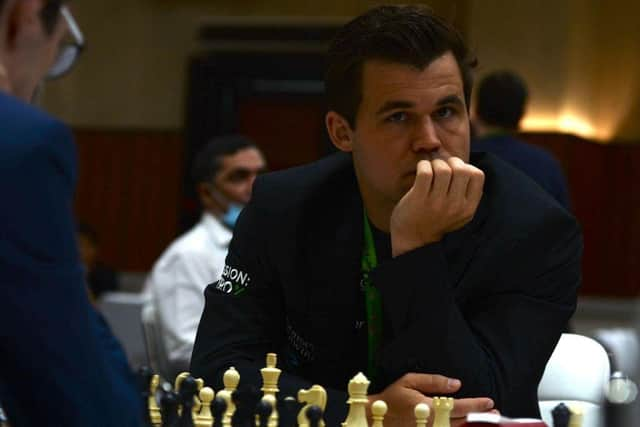If all cannot be fair in chess and fishing, we have serious problems - Jane Bradley
Not just because of the looming threat of nuclear war, environmental apocalypse or Suella Braverman’s very existence.
No, the essence of what makes humanity good is under threat. In recent weeks, cheating scandals have rocked the foundations of elite global competition in two wholesome activities not usually associated with duplicity and deceit – fishing and chess.
Advertisement
Hide AdAdvertisement
Hide AdObviously, we're all aware of cheating scandals in elite sport. There’s the elaborate ruse by Russian authorities to swap urine samples through a "mouse hole" drilled into the wall of the anti-doping lab at the Sochi Winter Olympics.


Then, there is teen figure skater Kamila Valieva – by coincidence also Russian – who is still under investigation despite her oh-so-plausible story of failing a drugs test after accidentally drinking from the same glass as her elderly grandfather who had just swallowed his prescription heart medication.
But cheating in fishing? That relaxing pastime with a worm on one end and a fool on the other (or so Samuel Johnson said)? No way.
Way.
"We got weights in fish," shouted Jason Fischer, director of the Lake Erie Walleye Trail tournament in the US, in an outburst captured on a video taken by a fishing fan last weekend. Sure enough, competitors Jacob Runyan and Chase Cominsky, who were set to walk away with a grand prize of $30,000 [£26,763], appear to have placed lead balls inside the fish they caught. The aptly-named Fischer was incensed and the video attracted 7.5 million views on TikTok.
How did they think they would get away with it? Surely experts, used to handling a 15lb flounder or a 2,000lb blue marlin, have skills akin to those of a midwife, who can estimate the size of an unborn baby with a quick glance at the mother’s bump – or like those of my shorthand teacher at journalism college who could read out any passage at the required words-per-minute speed without so much as a glance at a metronome.
When they see a fish of a certain size and shape, they must know immediately what it is likely to weigh. Yet the cheaters still couldn’t resist.
Chess, at the very top level, has become equally scandalous. Of course, as viewers of The Queen's Gambit, we had our suspicions. If you’re not downing handfuls of prescription drugs in between executing a fianchetto and queening a pawn, you can hardly call yourself a grandmaster.
However, a recent furore has seen real-life world champion Magnus Carlsen accuse rival, Hans Niemann, of widespread cheating. This week an investigation by tournament website Chess.com found Niemann had "likely" cheated in more than 100 games online.
Advertisement
Hide AdAdvertisement
Hide AdI have an insight into this intriguing world, due to a connection that I’m happy to share, as long as you promise not to tell anyone – I used to date one of Britain’s top junior chess champions.
Apparently, so he tells me (I forgave him for missing my 18th birthday for a chess tournament in the late 1990s and we remain friends), high-level players are constantly being quietly suspended by the major online platforms, amid fears they could have cheated in certain matches. Computer software can quickly spot a pattern emerging that raises suspicion – are the moves happening too fast for even the most brainiac of chess nerds? Does a decision appear to be an unexpected one to make – unless you are an automated machine that can look dozens of moves ahead into the future? If so, the player is suspended until he or she can explain their actions and if they can’t, they quietly disappear from the platform until their suspension is up.
If you are highly skilled at fishing, or chess – or athletics or figure skating – what do you have to gain from pretending that you are better at it than you actually are? Cash, perhaps, though in both these cases, the competitors have already won a significant amount.
What you can't win, unless you play fair, is pride.
Comments
Want to join the conversation? Please or to comment on this article.
